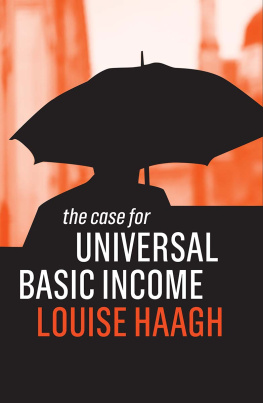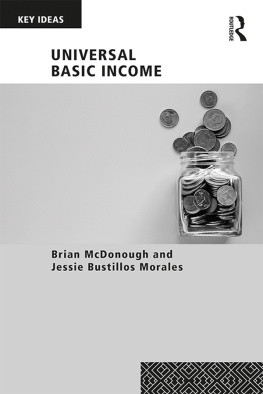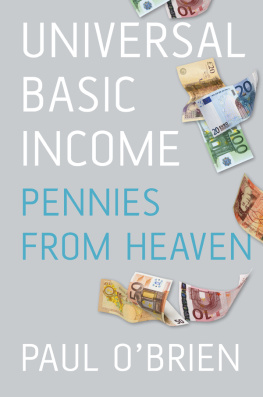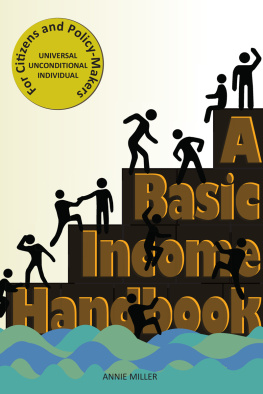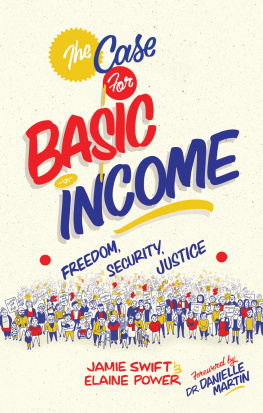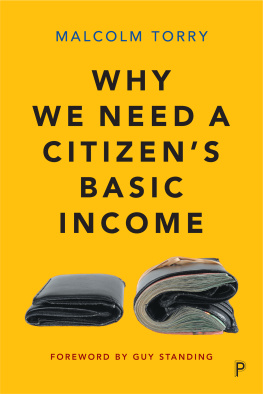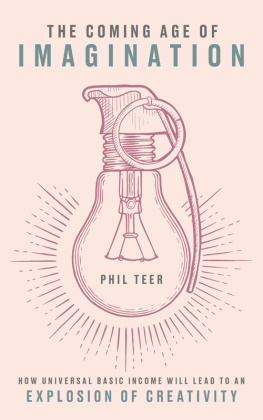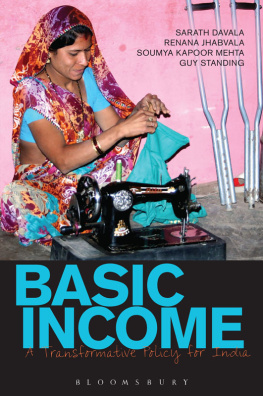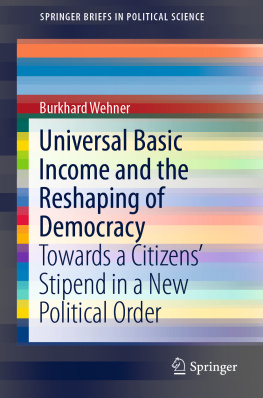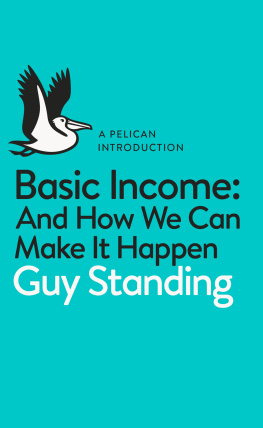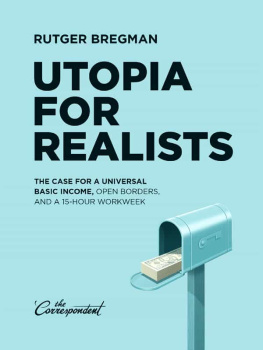
The Case For series
Sam Pizzigati, The Case for a Maximum Wage
Louise Haagh, The Case for Universal Basic Income
The Case for Universal Basic Income
Louise Haagh
polity
Copyright Louise Haagh 2019
The right of Louise Haagh to be identified as Author of this Work has been asserted in accordance with the UK Copyright, Designs and Patents Act 1988.
First published in 2019 by Polity Press
Polity Press
65 Bridge Street
Cambridge CB2 1UR, UK
Polity Press
101 Station Landing
Suite 300
Medford, MA 02155, USA
All rights reserved. Except for the quotation of short passages for the purpose of criticism and review, no part of this publication may be reproduced, stored in a retrieval system or transmitted, in any form or by any means, electronic, mechanical, photocopying, recording or otherwise, without the prior permission of the publisher.
ISBN-13: 978-1-5095-2299-6
A catalogue record for this book is available from the British Library.
Library of Congress Cataloging-in-Publication Data
Names: Haagh, Louise, 1967- author.
Title: The case for universal basic income / Louise Haagh.
Description: Medford, MA : Polity, 2019. | Series: The Case for | Includes bibliographical references and index.
Identifiers: LCCN 2018029800 (print) | LCCN 2018035479 (ebook) | ISBN 9781509522996 (Epub) | ISBN 9781509522958 (hardback) | ISBN 9781509522965 (paperback)
Subjects: LCSH: Income distribution. | Welfare state. | Distributive justice. | BISAC: POLITICAL SCIENCE / Public Policy / Economic Policy.
Classification: LCC HB523 (ebook) | LCC HB523 .H33 2019 (print) | DDC 331.2/36--dc23
LC record available at https://lccn.loc.gov/2018029800
The publisher has used its best endeavours to ensure that the URLs for external websites referred to in this book are correct and active at the time of going to press. However, the publisher has no responsibility for the websites and can make no guarantee that a site will remain live or that the content is or will remain appropriate.
Every effort has been made to trace all copyright holders, but if any have been overlooked the publisher will be pleased to include any necessary credits in any subsequent reprint or edition.
For further information on Polity, visit our website: politybooks.com
Acknowledgements
This book is the product of many peoples support. I especially want to thank the editorial team at Polity Press, above all George Owers, for his many wise suggestions, Ian Tuttle, for his incisive scrutiny, Julia Davies, for expertly overseeing the process of writing, and several anonymous referees, who commented generously on previous versions of this manuscript. All errors are mine.
The thoughts in these pages emerge from a diverse set of influences. Growing up in an egalitarian Nordic culture informed my perspective on substantive democracy. My work with local union leaders in Chile helped me understand the importance of local representation. Studying labour relations in East Asia and social protection in Latin America strengthened my sense of the importance of stable economic structures in human development. I became interested in basic income in 2002, and from the beginning perceived its key role in democratising the welfare state. After 2008 I became more preoccupied with the study of development in high income countries, a time coinciding with sustained crisis in the public sector, reinforcing in my mind a need to set basic income in a broader context of rethinking the civilisation project.
I am heavily indebted to the British Academy, the Nuffield Foundation, The Leverhulme Trust, and the Economic and Social Research Council, for funding research and fellowships over the years. I acknowledge the influence of my early mentors, Alan Angell, Laurence Whitehead, Samuel Valenzuela, and Gabriel Palma and Ha-Joon Chang.
My engagement with basic income debate is almost wholly down to the community of scholars and activists involved in the Basic Income Earth Network, including in order that I met them - Eduardo Suplicy, Philippe van Parijs, Guy Standing, Rubn lo Vuolo, Lena Lavinas, Karl Widerquist, Jurgen de Wispelaere, David Cassasas, Ingrid van Niekerk, Michael Howard, Almaz Zelleke, Claus Offe, Annie Miller, Malcolm Torry, and Sarath Dawala, to mention only some of the names.
I am grateful to my colleagues who have hosted recent debates on basic income, including BIEN Denmark, and in Britain, Marc Winn of the Dandelion Foundation, Anthony Painter of the Royal Society of Arts, and Lord Liddle, Jeff McMahan and Peer Zumbansen, for workshops at Westminster, Corpus Christi, and Kings College, during 2017-2018. I have learnt a great deal from recent engagements with international organisations, in particular the groups led by Gilda Farrell within the Council of Europe, and by Christine Brown, within the World Health Organisation. My deepest gratitude extends to my close friends and family, including Ed, Mille, Neil, Ato, and Teddy. I dedicate this book to my sons, and to the memory of my mother and grandparents, whose guidance remain my inspiration today.
Dedication
For Ato and Teddy, and in memory of Birte, Dagmar, Rigmor and Albert With love and gratitude
Basic Income in Time
A Democratic Humanist Case for Basic Income Reform
The idea of a basic income to give all residents a modest regular income grant that is not dependent on means-tests or work requirement has caught the attention of policy-makers and social activists across the globe. The proposal has been around for a long time. English radicals put forward a version in late eighteenth-century England: Thomas Spence as a dividend from communally owned land, If distributing money on a regular and life-long basis to everyone is desirable, why is the plan thought so controversial? And why has the idea not been pursued until now?
The first thing to note about basic income is the wide spectrum of support the scheme enjoys. Endorsements from varying ideological schools share a common claim from which this book takes its departure: whatever form you might think society ought to take, whether you support an enterprise or a cooperative economy, first, a society of individuals functioning on their own and together needs to come into being. Incorporation is a foundation for civilization, the market, human development, social equality and democracy. Postwar welfare states made strides in social incorporation, but their foundations were weak. Containing working-age adults within society was too reliant on one institution: the employment contract. This contract form lacked an independent underpinning. The result was bureaucratic intrusion into individuals decisions in the course of administering rights to subsistence. States which supported individuals freedom through health and schooling took it away in the marketplace. As employment became more precarious, the coercive implications of the lack of independent material security for all have only got worse.
Hence, this book argues for basic income as part of democratic reconstruction at a juncture of global crisis in governance. Capacity in the state and society for governing humanely with regard for each individuals trajectory depends on the polity first acting in a society-constitutive role, defined as building individual capabilities, on the one hand, and cooperative capabilities, on the other. The case for basic income I make is therefore a case for democratic equality grounded in equal interests humans have in existential security. Basic income can be viewed in this context as a pivoting transformation, a form of institution-building that, by stabilizing the individual economy, can ignite other positive changes. The political scientist Bremner described states that gain strength and stability within the international system by not being reliant on any one other state as pivoting states. Basic income is grounding in a broader as well as deeper sense, in this case as stabilizing the lives of all individuals makes for more resilient communities, sub-nationally, nationally and globally. A civilized social order depends on not just strategic players but all constituent units enjoying a foundation of existential security.
Next page
